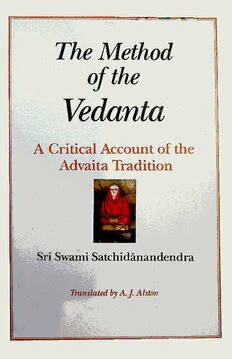
The Method Of The Vedanta: A Critical Account Of The Advaita Tradition PDF
Preview The Method Of The Vedanta: A Critical Account Of The Advaita Tradition
The Method of the — Vedanta A Critical Account of the Advaita Tradition Sri Swami Satchidanandendra Translated by A. J. Alston THE METHOD OF THE VEDANTA THE METHOD OF THE VEDANTA A Critical Account of the Advaita Tradition SRI SWAMI SATCHIDANANDENDRA SARASVATI Translated from the Sanskrit by: A.J. ALSTON MOTILAL BANARSIDASS PUBLISHERS PRIVATE LIMITED e DELHI First Indian Edition: Delhi, 1997 First published in 1989 by Kegan Paul International Limited, London © A.J. Alston 1989 No part of this book may be reproduced in any form without permission from the publisher, except for the quotation of brief passages in criticism. ISBN: 81-208-1358-8 Also available at: MOTILAL BANARSIDASS 41 U.A. Bungalow Road, Jawahar Nagar, Delhi 110 007 8 Mahalaxmi Chamber, Warden Road, Mumbai 400 026 120 Royapettah High Road, Mylapore, Chennai 600 004 Sanas Plaza, Subhash Nagar, Pune 411 002 16 St. Mark's Road, Bangalore 560 001 8 Camac Street, Calcutta 700 017 Ashok Rajpath, Patna 800 004 Chowk, Varanasi 221 001 PRINTED IN INDIA BY JAINENDRA PRAKASH JAIN AT SHRI JAINENDRA PRESS, A-45 NARAINA PHASE I, NEW DELHI 110 028 AND PUBLISHED BY NARENDRA PRAKASH JAIN FOR MOTILAL BANARSIDASS PUBLISHERS PRIVATE LIMITED, BUNGALOW ROAD, DELHI 110 007 FOREWORD There is a saying of those that know the tradition: ‘That which cannot be expressed is expressed through false attribution and subsequent recantation. * Every argument has its origin in certain life-contexts, certain cultural situations. No argument starts in a vacuum because human beings are born in an already interpreted world. That world assumes a certain form of life, a form of life in which man is born and lives. Yet there is something amiss in every interpretation, some lack, some lapse, something missed and not grasped. Hence the urge to improve upon every received world view, every cultural disposition. We, sons and daughters of man arc children of ontological disin- heritance, we who live as perpetual displacements. This original penury we would undo through replacing one interpretation with another interpretation, one discourse with another discourse, one reality principle with another reality principle. The history of cultures is replete with such pathetic attempts. Myths gave place to theology, theology to philosophy, philosophy to science and, within each of these discourses, the less sophisticated interpretations to the more sophisticated ones. There is, as I said, something pathetic, * Sankara on the Bhagavadgita (13.13) tal even, I would say, tragic, about these attempts. For discov- eries often turn into closures, triumphs into disasters, progress into decline. New world views often demand a heavy price in terms of practice and its decadence, even in terms of holocausts and suicidal wars. Our new world view may, sometimes one fears, end up in an unprecedented tragedy. To repose faith in new interpretations and new discourses is to be insensitive to the enormity of our loss, to the impov- erishment of our souls and the staleness of our world. It is to be asleep to the truth that we know neither ourselves, nor our world, nor the awesome majesty of the word that we so heedlessly reify into a mere utensil. Three fourths of man, say the Vedas, is lost to man and three fourths of the word. To find what he has lost of himself and of his speech, he has to give up the arrogant privilege he has appropriated for himself, the privilege of giving meaning to what is, of inter- preting it in terms of concepts, received or fabricated. This, says the Vedantic tradition, is avidya, this what he would call a privilege. For all that he deems to be tragic and cursed flows from it, from this interpretive passion which resides in man as something more primordial than himself. This act of deprivileging himself he cannot accomplish through that of a leaping will, itself a child of avidya but through a sustained and careful analysis of his interpretations and, more impor- tantly, through living the dispositions they imply. For we cannot, warns the true tradition of. Vedanta, conclusively refute an interpretation in purely theoretical terms. Some- thing in it survives all criticism, all refutation. One has to live the disposition implicit in a given interpretation to find it disown itself. Every interpretation is, to recant a little of what has been said above, redemptive, redemptive to the extent it can disown itself, find itself false. This it can but
